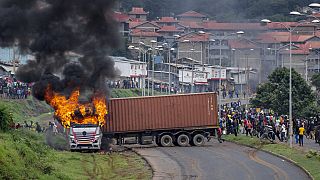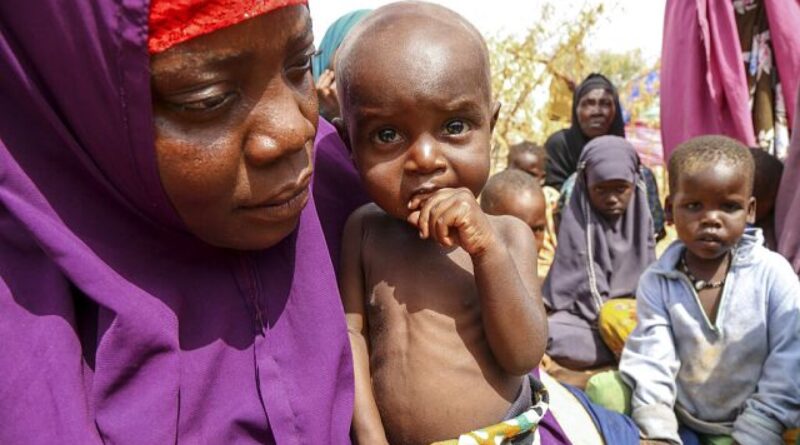Three percent of the world suffered acute food insecurity last year
FILE – Nunay Mohamed, who fled the drought-stricken Lower Shabelle area, holds her one-year old malnourished child at a displaced peoples’ camp outside Mogadishu, June 30 2022
–
Copyright © africanews
Farah Abdi Warsameh/Copyright 2022 The AP. All rights reserved.
hunger
Conflicts, climate change and the COVID-19 pandemic made more than a quarter-billion people suffer acute food insecurity last year in 58 countries.
That’s roughly three percent of the global population which now stands at eight billion.
Acute food insecurity is when a person’s inability to consume adequate food puts their lives or livelihoods in immediate danger.
In seven of them – Somalia, Afghanistan, Burkina Faso, Haiti, Nigeria, South Sudan and Yemen – people faced starvation and death.
The findings were laid out in a report by the Global Report on Food Crises, an alliance of humanitarian organisations founded by the U.N. and European Union.
While the increase last year was due in part to more populations being analysed, the report also found that the severity of the problem increased as well, “highlighting a concerning trend of a deterioration.”
The report found that the number of people facing acute food insecurity and requiring urgent food aid — 258 million — had increased for the fourth consecutive year, a “stinging indictment of humanity’s failure” to implement U.N. goals to end world hunger, U.N. Secretary-General António Guterres said.
Rein Paulsen, director of emergencies and resilience for the U.N. Food and Agriculture Organisation, said an interplay of causes was driving hunger. They include conflicts, climate shocks, the impact of the pandemic and consequences of Russia’s war in Ukraine that has had an impact on the global trade in fertilisers, wheat, maize and sunflower oil.
The impact has been most acute on the poorest countries that are dependent on food imports. “Prices have increased (and) those countries have been adversely affected,” Paulsen said.
He called for a “paradigm shift” so that more funding is spent investing in agricultural interventions that anticipate food crises and aim to prevent them.
“The challenge that we have is the disequilibrium, the mismatch that exists between the amount of funding money that’s given, what that funding is spent on, and the types of interventions that are required to make a change,” he said.
The U.N. World Food Programme’s new chief issued a warning that the agency’s resources to provide food aid amid the surging needs are “running dangerously low.” Executive Director Cindy McCain told panellists at an event to present the report that the agency could be forced to make “heart-breaking decisions to slash” assistance if substantial new funding doesn’t materialise quickly.
On a visit to the Horn of Africa McCain had earlier tweeted “the world cannot forget about Somalia.”
You may also like

Most read




